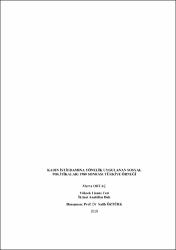| dc.contributor.author | Ortaç, Merve | |
| dc.date.accessioned | 2020-03-05T08:05:48Z | |
| dc.date.available | 2020-03-05T08:05:48Z | |
| dc.date.issued | 2019 | |
| dc.identifier.uri | https://hdl.handle.net/20.500.11776/3633 | |
| dc.description.abstract | Bu çalışmada, Türkiye’de kadın istihdamının 1980 tarihinden günümüze kadar olan gelişimi araştırılmış ve kadın istihdamının ekonomik büyüme üzerindeki etkisi toplumsal yapı çerçevesinde diğer ülkeler ile kıyaslanmıştır. İş gücü ve istihdam gibi kavramlar küreselleşme ile birlikte teknolojinin gelişimi ve sosyo-kültürel alanlarda yaşanan değişimler farklı sektörlerin ortaya çıkmasına neden olmuştur. Bu süreçte emeğin yapısında meydana gelen değişimler, kadınların iş yaşamında farklı sektör ve iş alanlarına yönelmelerinin önünü açmıştır. Ülkemizin iktisadi büyüme hedefine ulaşabilmesi için, kadın istihdamının arttırılması ve sürdürülebilir olması ekonomik kalkınmanın önemli bir faktörü olarak görülmektedir. Ülkemizde kadın istihdamı sektörlere göre farklılık gösterdiği gibi bölgelere ve eğitim seviyesine göre değişimi istatistiki verilerden yararlanılarak analiz edilmiştir. Kadın istihdamının tarihsel süreci incelenmiş, sanayi devrimi sonrası süreçte yaşadıkları sorunlardan bahsedilmiş ve ülkemizde çalışan kadınların iş hayatında maruz kaldığı cinsiyete dayalı ayrımcılık, toplumsal yönden ele alınmıştır. Ülkemizde kırsal kesimde yaşayan eğitim almamış kadınların büyük bir kısmı ücretsiz aile işçisi olarak sosyal güvencesi olmaksızın çalışmaktadır. 1980’li yıllarda kadınlarda %80 seviyelerinde olan kayıt dışı istihdam, TÜİK verilerine göre 2006 yılında %76,8 seviyelerine inse de, beklenen düzeyde olmamıştır. Devletin düzenlemiş olduğu sosyal politikalar, kadınlara yönelik açılan sanat, girişimcilik kursları, devlet tarafından desteklenen projeler ve İŞKUR gibi uygulamalar sayesinde yükselişe geçmiştir. Zorunlu eğitim süresinin arttırılması, hizmet sektörünün yükselişe geçmesi ile 2017 Kasım ayında TÜİK istatistiki verilerine göre, kadınlarda kayıt dışı istihdam oranı %43,13 düzeyine inse de, gelişmiş ülkeler ile kıyaslandığında yetersiz kaldığı görülmektedir. Çalışmada Türkiye’de kadın istihdamının arttırılmasına yönelik uygulanan sosyal politikalar saptanarak analiz edilmiştir. | en_US |
| dc.description.abstract | In this study, the development of women's employment in Turkey from 1980 to the present day was investigated and the impact of women's employment on economic growth was compared with other countries within the framework of social structure. Concepts such as Labour and employment, along with globalization, the development of technology and changes in socio-cultural areas have led to the emergence of different sectors. In this process, the changes in the structure of Labor have paved the way for women to turn to different sectors and business areas in their work life. In order for our country to reach its economic growth target, increasing female employment and being sustainable is seen as an important factor of economic development. As women's employment in our country differs according to sectors, its change according to regions and education level has been analyzed using statistical data. The historical process of women's employment was examined, the problems they experienced after the Industrial Revolution were mentioned and gender discrimination faced by working women in our country in business life was addressed from a social perspective. The majority of women living in rural areas of our country without education work as unpaid family workers without Social Security. Informal employment in women, which was 80% in the 1980s, fell to 76,8% in 2006, according to TUIK data, but it has not been at the expected level. Social policies organized by the state, the Arts opened for women, entrepreneurship courses supported by the state projects and IŞKUR has been on the rise. According to TUIK statistical data, although the informal employment rate of women fell to 43,13% in November 2017 due to the increase in the compulsory education period and the rise of the service sector, it is seen to be insufficient compared to developed countries. In the study, social policies aimed at increasing female employment in Turkey were determined and analyzed. | en_US |
| dc.language.iso | tur | en_US |
| dc.publisher | Namık Kemal Üniversitesi | en_US |
| dc.rights | info:eu-repo/semantics/openAccess | en_US |
| dc.subject | Kadın istihdamı | en_US |
| dc.subject | Sosyal Politika | en_US |
| dc.subject | Toplumsal Cinsiyet | en_US |
| dc.subject | İktisadi Büyüme | en_US |
| dc.subject | Female Employment | en_US |
| dc.subject | Social Policy | en_US |
| dc.subject | Gender | en_US |
| dc.subject | Economic Growth | en_US |
| dc.title | Kadın istihdamına yönelik uygulanan sosyal politikalar: 1980 sonrası Türkiye örneği | en_US |
| dc.title.alternative | Social Policies For Women's Employment: The Example Of Turkey After 1980 | en_US |
| dc.type | masterThesis | en_US |
| dc.department | Enstitüler, Sosyal Bilimler Enstitüsü, İktisat Ana Bilim Dalı | en_US |
| dc.relation.publicationcategory | Tez | en_US |



















